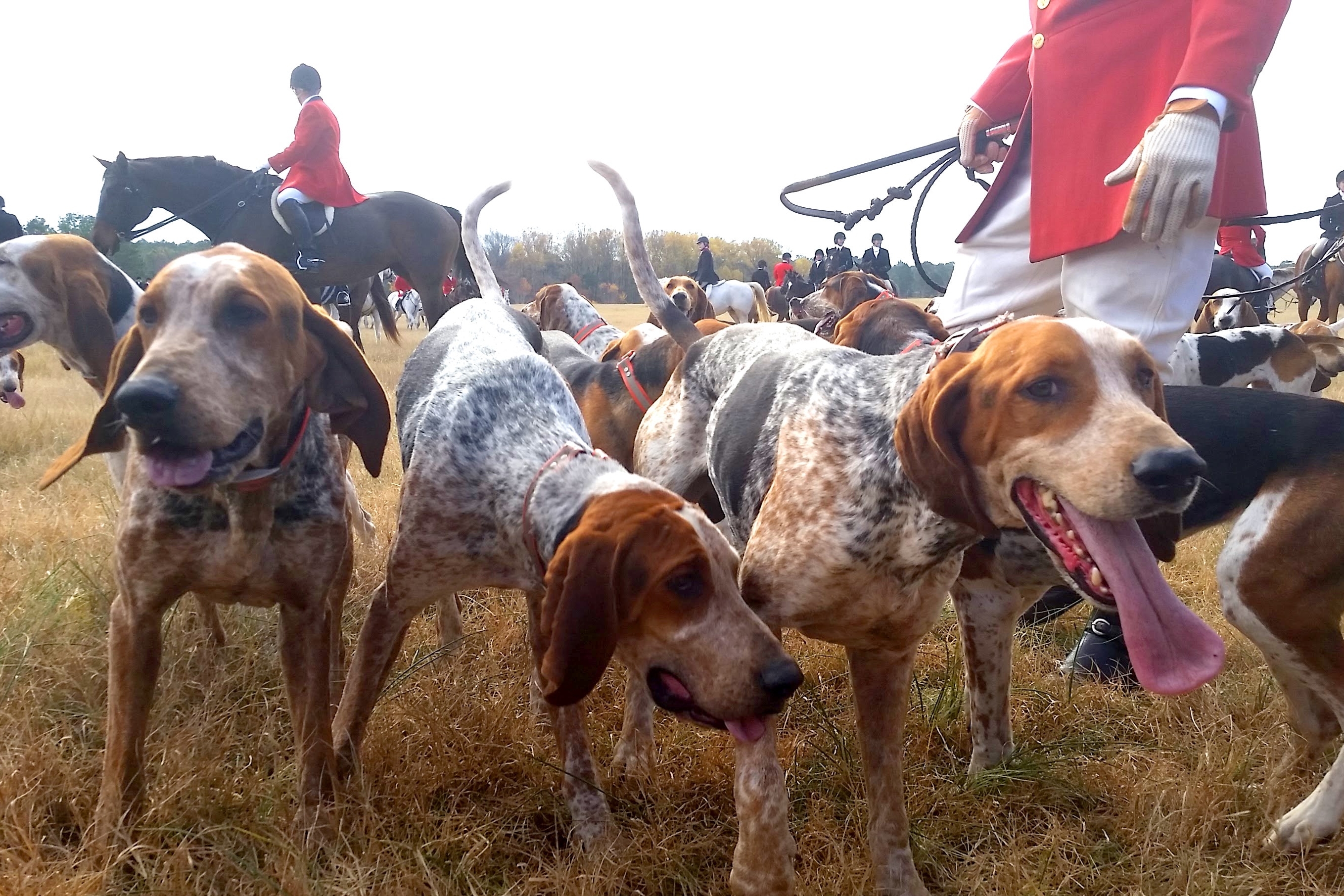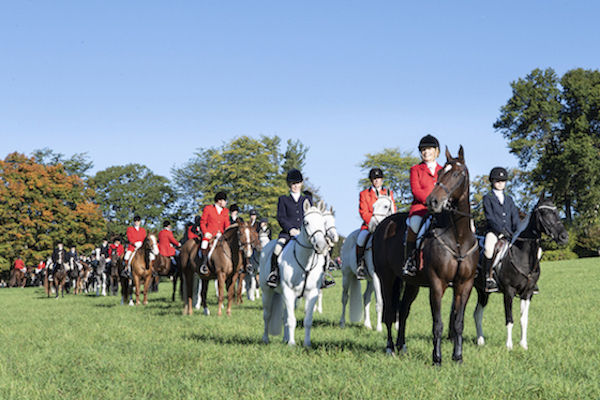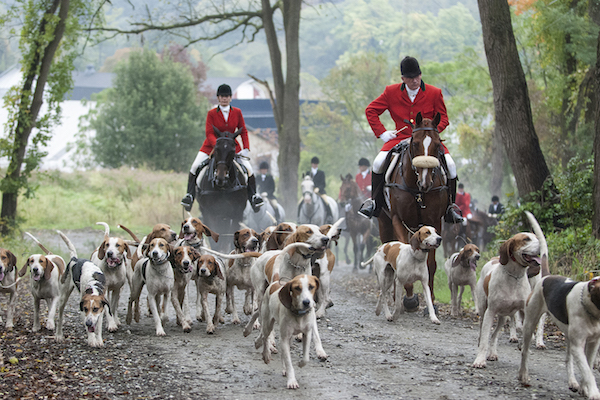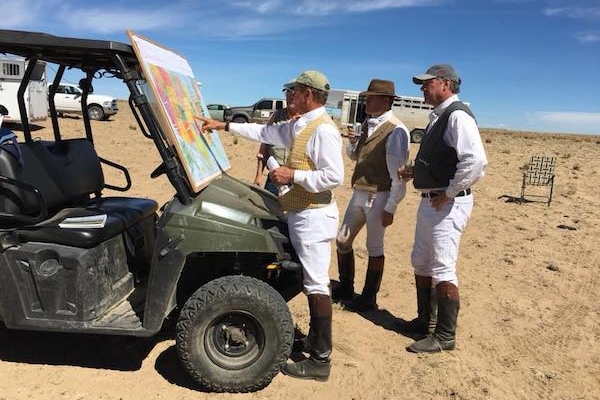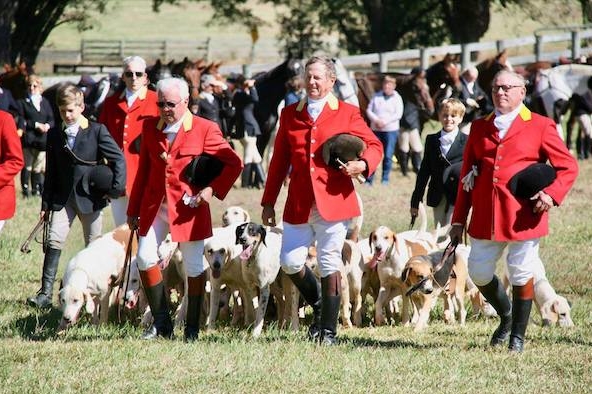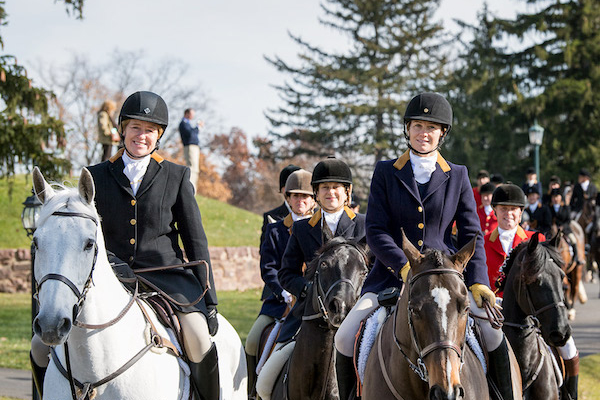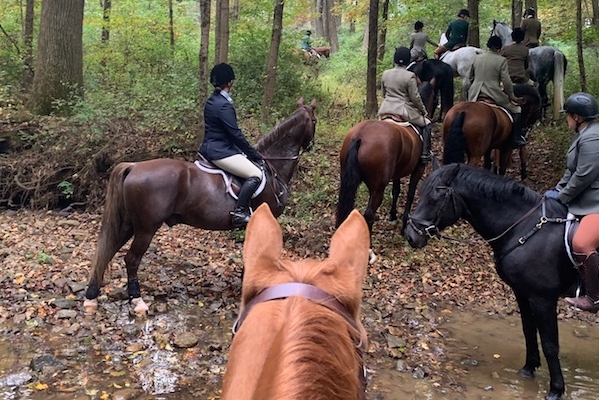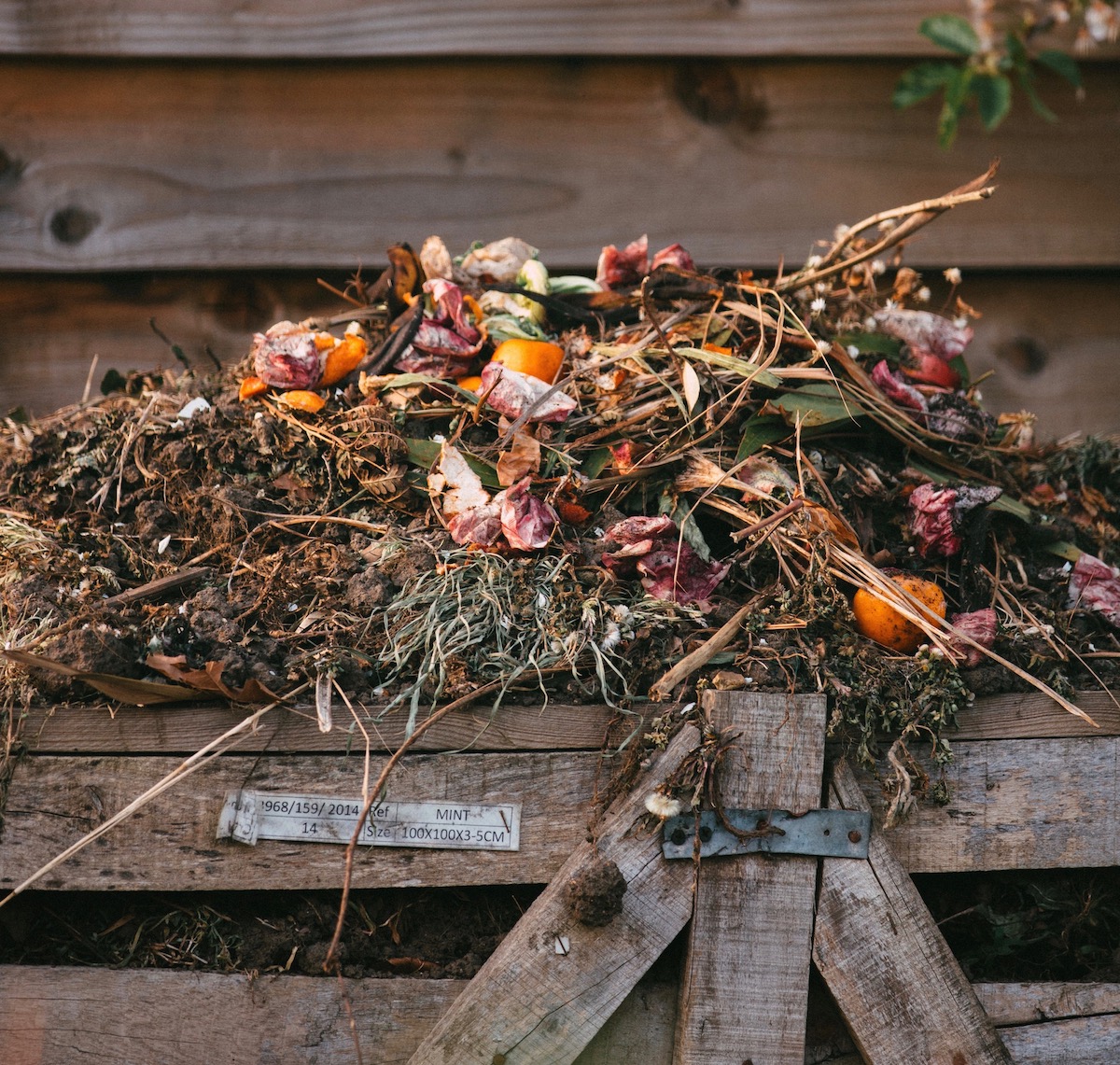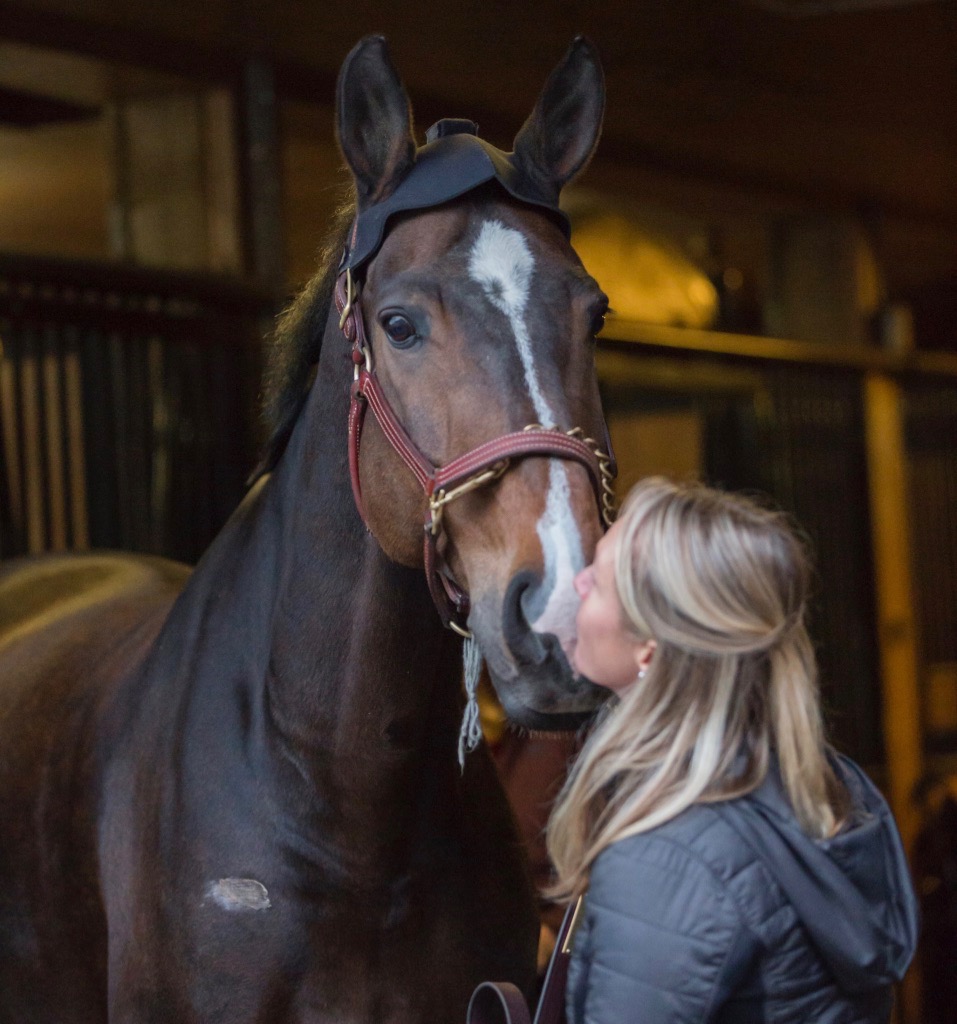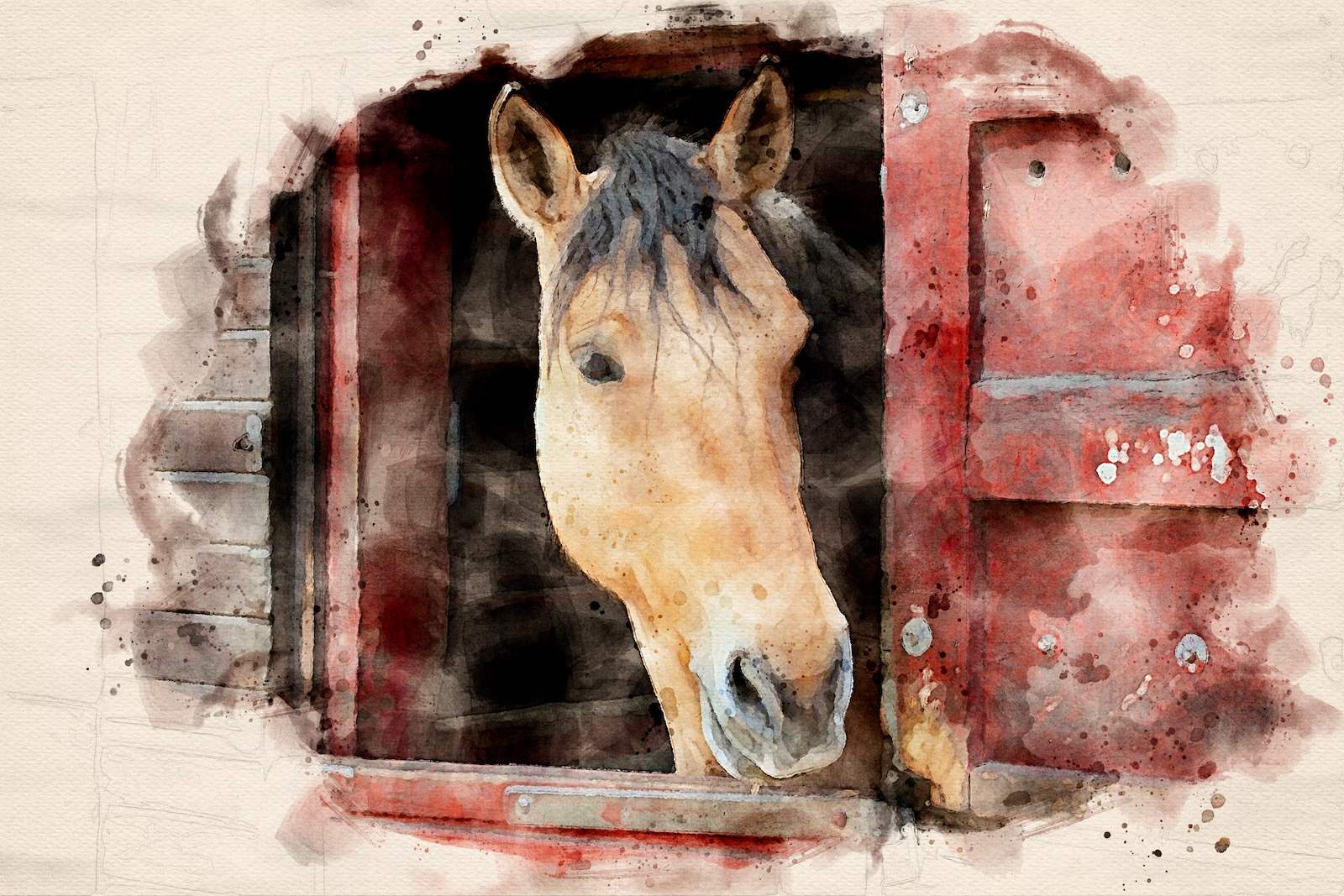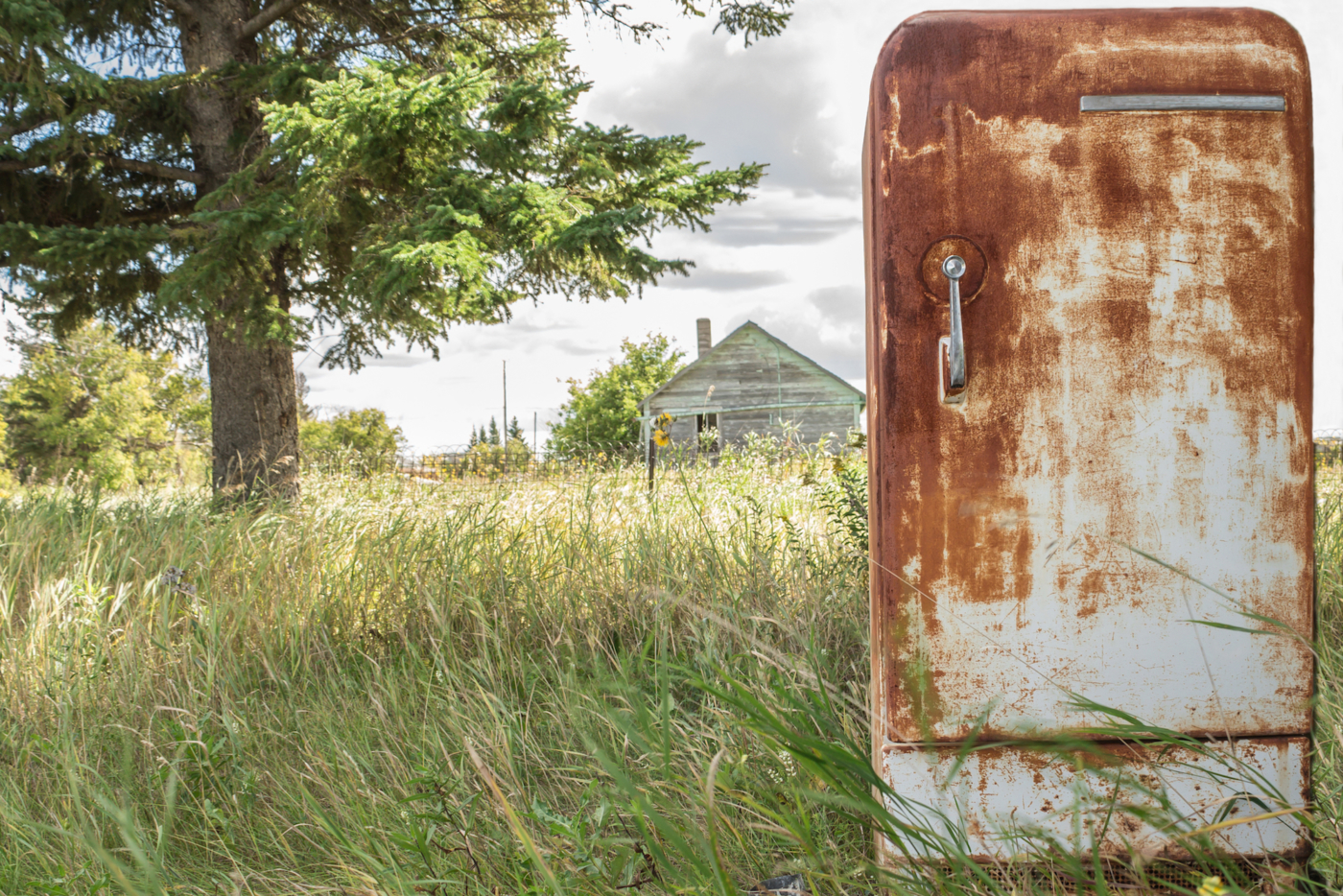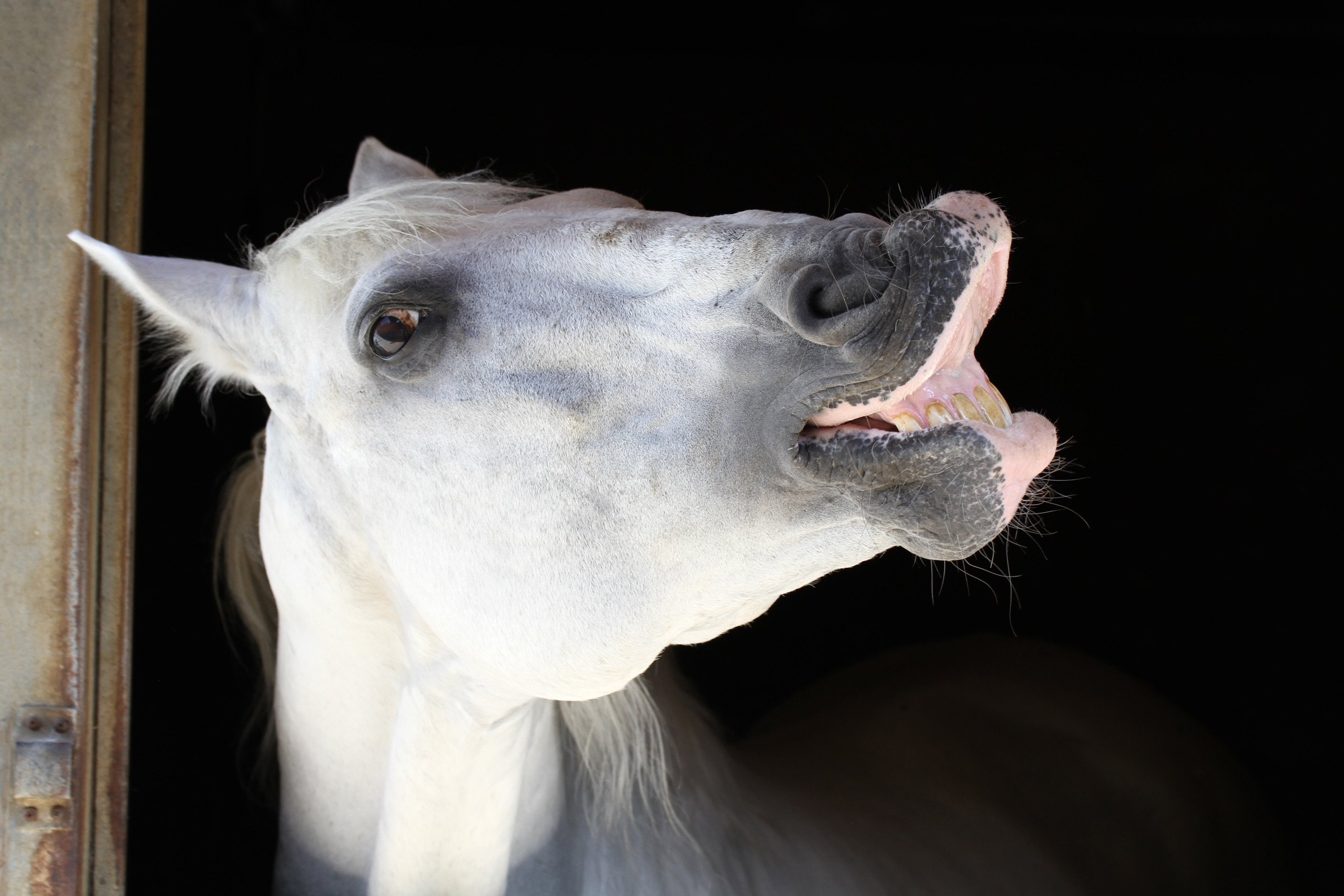Among the range of equestrian disciplines enjoyed around the world, fox hunting claims the enviable reputation of promoting the most fellowship and fun. According to those familiar with the sport, the tradition of lengthy gallops followed—and sometimes preceded—by the clinking of port glasses is one that elicits a strong allure for which few, once experienced, can shake.
Therefore, we approached several seasoned fox hunters, from the northern territories to the south, with hopes of learning more about this thrilling pastime. Fernanda Kellogg, Jazz Merton, and Epp Wilson shared what the future holds for such a legacy-driven exhibit of horsemanship and kindred bonding, as cultural norms and public land rights shift before us.
Our enlightening conversations introduced us to an entirely new vernacular (they are not dogs, they are hounds), emphasized that fox hunting is multi-generational and available to even the most amateur rider, and delivered a surprising tidbit for those horses and riders facing challenges in the arena (hint: get out on the open land!).
There are 150 hunt clubs in North America, and most will formally kick off the season in early November. With fox hunting in full swing across the country, may the excerpts from interviews below inspire you to add a new family of riders to your list of equestrian resolutions for 2020.
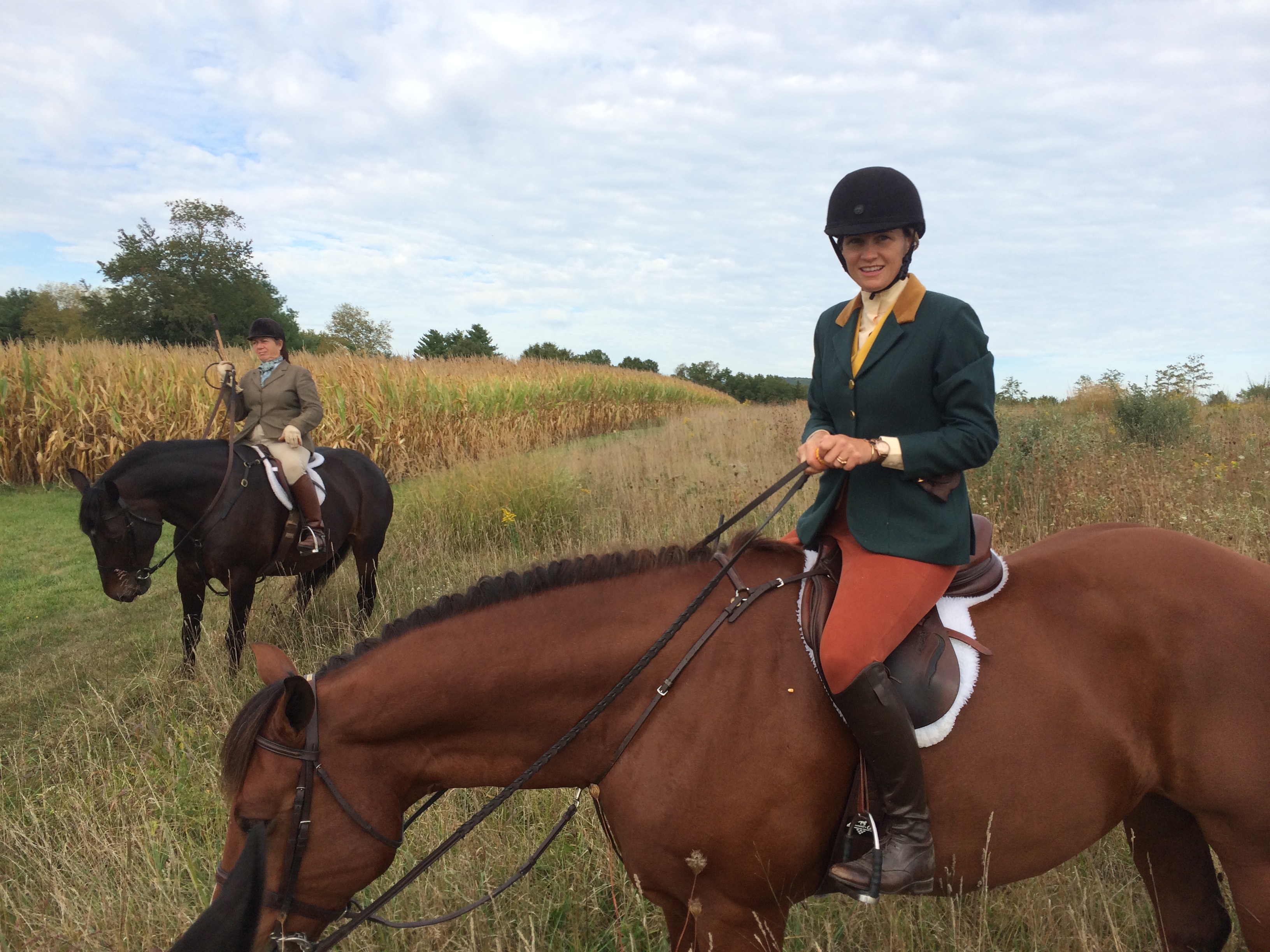
Jazz Merton on her mount, “Pork Chop.”
How were you first introduced to fox hunting?
Fernanda Kellogg, Master of Foxhounds, Millbrook Hunt, Millbrook, NY:
I’ve been hunting most of my life because there was no school that I wanted to go to, or school wasn’t going to be good enough, unless I could take my horse, too. From grade school through college, the schools I attended gave me an opportunity to go fox hunting—in those days, the only opportunity to get off campus and have a moment in the outside world. The hunting was great, but being off campus was just as good as the hunting!
Epp Wilson, MFH, Belle Meade Hunt, Thomson, GA:
My father always loved horses, and when he was a kid, he always wore his riding boots to the barn, hoping he’d have time to ride before dark. This earned him the nickname “Boots.” So his entire life he was known as Boots Wilson, uncle Boots, and his grandchildren called him Daddy Boots and called my mother Mama Boots. He formed the Belle Meade Hunt in 1966 with his best friend Mr. Knox. Our club house is called Boots Hall in honor of my late father. I’m the youngest of four brothers, and our father took us fox hunting when I was as young as seven years old.
Jazz Merton, MFH, Essex Fox Hounds, Gladstone, NJ:
At age eight, I started hunting with my older brother who was very interested in horses and a competitive carriage driver. That kind of grew into a bigger passion for me for competitive show jumping, and always as a hobby I have been involved with the hunter/jumper ring. More recently, in the last ten years, I was asked to become a Master of the Essex Foxhounds, so I guess you can say I have been enjoying hunting a little more frequently!
(left) Fernanda Kellogg; (right) Kellogg with huntsman Donald Philhower.
Epp, you have been on-the-go this year. What have you been up to?
EW:
This year my wife Judith and I were on the trip of a lifetime as part of my role as Hark Forward Performance Trials Chairman. We leap frogged our way around the U.S. and Canada with the Masters of Foxhounds Association for one month in the spring, and one month in the fall attending performance trials, field hunter championships, and regional joint meetings. Trailering over 15,000 miles with our horses, we visited 25 different hunts, and interacted with more than 70. Travel a day, rest the horses, hunt, repeat.
Are there stark differences geographically when fox hunting across the U.S.?
EW:
Out west there are very different territories and conditions than on the east coast. The methods of the east coast don’t work out west and the methods on the west coast don’t work east. In the west you have different hounds with different scenting abilities because there is not much moisture in those places. Therefore, as you move west, most hunts don’t do much trailing because there is very little scent. Some hunts have half a million acres in the high dessert and its fabulous, but the whips might be a quarter mile away, view a coyote, and then the huntsmen will hark the hounds forward. The hounds out west can and will trail, but the conditions are just different. Our more western brethren have learned to embrace those conditions and fox hunt successfully.
FK:
I like to talk about the similarities. What everybody shares is this camaraderie and love of the sport. No matter where you go there is this love of what you are doing and a love of the horses. Of course everybody loves their countryside because theirs is the most beautiful and they are passionate about their hunt! I think fox hunting pulls people together more than it sets them apart. I come home with a story from every hunt.
I also love to talk about the hounds. You get to learn and enjoy watching the hounds work. Each hunt develops its own pack and breeding program and each huntsman has his own style. It is fun to learn about the young entry, which is the puppies when they first go out in their first season, at about a year and a half of age. You walk them and then you start hunting them on foot, and then they go out with everyone mounted. Performance Trials will have a few hounds from several packs (different hunt clubs) where a hound’s performance is judged in a competitive way in a natural hunting setting. Which hound finds the scent, which hound follows the scent the best, and which hound has the best voice.
Access to open land is increasingly limited in many regions of the country, though crucial to the future of the sport. How do you maintain access to land?
FK:
That’s probably the most difficult part. The land availability for hunting is the biggest issue for all hunts across the country for a lot of different reasons but mostly because open land is being encroached upon, open land for wildlife is more and more limited. Most hunts rely on landowners who allow them the privilege to ride over their private land. There are some exceptions, such as the drag hunt in Aiken’s Hitchcock Woods, but most of the time you are hunting on private land with permission, and that’s the most valued thing—landowner relationships with the hunt are very important relationships that we have to maintain.
If the hunt has a long tradition and is part of the history of the community, that helps. If you have an equestrian community, that helps. Masters that have relationships with landowners, that helps. And being very responsible to your landowner who might say “You are welcome on my land but don’t come near my house.” Closing the gates is a huge thing, and staying to the edge of fields so that we’re not riding over crops. The biggest relationships often is with the members of the hunt and the local land conservation organizations. Many people who fox hunt support land conservancy. It is a good synergy.
EW:
This is the most important job I have as Master of Foxhounds. If you have nowhere to hunt, you’ve got nothing. We have a small community, and so we are a part of the fabric of the community. We rely on the community, from land owners and first responders to churches and historic foundations. From the start, Belle Meade was very family and community oriented. We host fundraisers to thank them for their service, and always have a blessing. That’s how we are raised here, to support the community.
JM:
The pressures of society and development and regulation require a lot of teamwork between regional packs and landowners to preserve the sport. I do believe there are ways of achieving that kind of teamwork without individual hunts and packs compromising their own legacies. Fox hunters regionally will have to get creative together to preserve hunting. More of this has happened in England, but I think it is part of the future of hunting in America.
(left) Epp Wilson with fellow riders outside of Albuquerque, NM during the Hark Forward North America tour.; (right) Wilson at the Blessing of the Hounds on Opening Day.
For those of us devoted to other riding disciplines, are there advantages to adapting our horses to fox hunting?
JM:
Absolutely. I’ve seen situations where horses that lost confidence in the ring were able to get that back by fox hunting. Just being out on cross country and dealing with different elevation and terrain and also, they are herd animals, so obviously being in a group gives them a ton of encouragement that way. It can be very effective in bringing horses back to a competitive environment when, for a number of reasons, they have been turned off. It gives them an opportunity to develop different skills and even different muscles, and balance. It does so much for a horse’s balance, being able to ride out in that environment. Fox hunting is a great idea if you are thinking of trying it with your competition horse.
As it goes, and the way fox hunting works with an early summer start, it progresses in a way that is conducive to bringing along horses that are inexperienced, in a safe way. A lot of people are appropriately timid about fox hunting with horses that haven’t done it before. It can be quite chaotic, and there is a fair amount of drama, and it can be noisy with hounds in full cry and the sound of the horn. All of those elements are very excitable to animals. But I do think there is a way to manage that and introduce them slowly and that can be really positive and is such a huge confidence builder for riders and horses.
In fact, what I’ve found now is since there aren’t as many facilities where there is training and guidance available to people who want to try fox hunting—because primarily as you know, most barns are based in other competitive equestrian sports—it’s not as easy to find places where they have training and support for introducing and teaching fox hunting. A lot of hunts, if they are well organized in this regard, they have new members who are trying the sport paired up with more experienced fox hunters to really ensure everybody has a positive time. Its handled carefully and softly so that everyone is set up for success.
How can one dip their toe into into fox hunting without fully tacking up?
EW:
We have a “Tally Ho!” truck that follows the hunt, so people can come out and see what its like. Take it in baby steps. Hop on the truck, then come out in Fourth Flight on a seasoned horse, then bring your own. We encourage everyone to try it. We’ve got the best set of lease horses we’ve ever had, from First Flight to Hilltoppers. We generally keep a little snake bite remedy in the Tally Ho! truck to make it a bit more enjoyable, too.
FK:
Most hunts welcome volunteers to help with the hounds at the kennels. Some hunts also welcome people on foot to follow behind. It is a good introduction. Every hunt has a secretary who knows all of this information, including club costs, where to meet, and how to find a suitable horse. The club secretary is a key element for everything one needs to know.
What do you think is the most misunderstood aspect of the sport?
JM:
There is a perception that fox hunting is wild and crazy and dangerous and elitist and at times irresponsible, and I don’t believe that’s true. I think what hunting does is celebrate the fox, the horse, and the hound, and it shows gratitude for an open and beautifully rolling countryside. Many of our members are preservationists and great stewards of the land, and have so much respect for the land on which they hunt. There is inherent risk in riding a horse, whether you are showjumping, reining, eventing … any of these sports can be dangerous, but there is a way to do it that is strategic and controlled, and similarly, a way to approach hunting that can be safe and smart.
EW:
We are inclusive, not exclusive. I think a lot of outsiders assume that everyone who hunts is “hoity toity” because of its English roots, and it could not be further from the truth. We like to let our hair down and have fun, but for the sake of tradition, we dress in a certain attire and abide by certain customs. We come from all walks of life but share one passion! I like to say that if you want to ride while holding your pinky and your heel just right, then go in an arena!
FK:
Most of us love the chase, and have very little interest in and avoid the kill. In Millbrook we chase the coyote almost more than anything else and we are the only controlling influence over the spread of coyotes in our area … they have almost no natural predator. The area farmers very much appreciate what the hunt can do to help keep a balance of nature.
(left) Karen Murphy, left, and Jazz Merton, right, Joint-MFH of Essex Fox Hounds. Photo: Priscilla K. Miller; (right) Jazz Merton looks on between the ears of her chestnut, Hero.
How do you see this sport evolving with modern times and maintaining its legacy?
FK:
To always make sure that everybody has fun. Hunting in the end is supposed to be fun with your horse. I’m passionate about it, because it the most fun thing I do, more than any other part of my horse life. There is a place for all level of riders and fox hunting can be a family sport. We can have young kids on a lead line with their parents, and pony club riders into their teens, all the way through to people in their 70s who continue to hunt. It is not age specific at all.
EW:
Fox hunting today is competing with iPhones, Snapchat, Facebook, video games. There are so many other distractions these days, its harder than ever to get young people interested, and then keep them interested and going. If you can get a local barn to promote fox hunting and bring the kids out—kids need a critical mass of other kids. When they get out there and have fun, they’ll come back! And then hopefully one day they will bring their children. It is a continuous cycle.
JM:
We try to have events and clinics and provide opportunities for people to come hunt for the day for a fee, just to try it out a few times before they subscribe. We create safe situations for people to test the waters. It is a team effort. Hunts can be very successful if they are well organized. Some have as many as four joint masters of one pack. It helps spread around the work and attracts a broader membership.
We have to ask, is it true most hunts start with a toast of liquid courage?
JM:
I think that it depends on the fox hunter! Historically, yes, fox hunting has been somewhat associated with the kind of cheer that gives you the courage to test your own limits out on horseback. I think also that what is important for me and the biggest aspect of fox hunting is the celebration of it. It’s not just the courage and cheer, it’s the notion that some of the biggest meets have taken place on holidays—essentially raising your glass in celebration of these important things. You become very close with the people with whom you share this passion. It is a family feeling.
FK:
The Stirrup Cup! This happens maybe a third of the time—your Thanksgiving Hunt, your Opening Hunt, the Columbus Day Hunt—those kinds of holiday hunts will start with a Stirrup Cup, where we pass around port in a little shot glass on a silver tray to warm everybody up before they take off, and then breakfast after. There are special dishes for hunt breakfasts, with northern vs. southern recipes. Many books have been published about hunt recipes.
Any other rituals special to the sport?
EW:
I always say that fox hunters get out in God’s most wondrous cathedral. If you like horses, hounds, and the great outdoors, then fox hunting is the sport for you. We even have an ashes scattering ceremony with an order of worship because so many of our members want their ashes scattered in hunt country, which is a huge honor. That’s a big deal! Where you want your ashes scattered is what meant most to you in your life. There is a poem that inspired the ashes scattering, by Michael Fifer:
Scatter wide my ashes o’er the fields where foxes run.
Saddle up my horse with whom I’ve had the best of fun.
Put my boots into the stirrups with the spurs both pointing fore,
As I’m out to jump a fence or two I’ve never jumped before.
I’ll open up new country. No, I’ll not be coming back.
Can you hear the Heavenly music? It’s the tonguing of the pack.
Our order of worship is something magical with the combination of horses and hounds and the great outdoors. One of the largest land owners in our area with over 5,000 acres tells his friends that people want to have their ashes scattered on his property. I’ve had people come to me in a quandary and say, “I want to have my ashes scattered in hunt country but I want to be buried, not cremated!” I say leave us a lock of hair, we’ll cremate it in the fire pit in front of Boots Hall, and scatter the ashes! Here is one important tip: make sure you are not up wind of the crowd during a scattering ceremony!
With special thanks to Kathy Landman, Priscilla K. Miller, Constance Silverman, and Judith Wilson for images.
Fox hunting has a language all of it’s own. The MFH share some of their favorite terms from the field:
Fernanda:
“Tally ho!” When the huntsman views a fox or coyote or bobcat he or she will say “tally ho” to alert everybody that the hounds are on a run. Most huntsmen know their hounds so well that they can hear the difference in their cry depending on what scent they’re on.
“Hound up!” A hound is coming from behind and is going to pass by your horse, close to your horse, or to the side of your horse. The hound is underfoot!
Epp:
“Hold hard!” I say this to my grandkids. It means stop where you are and be quiet! The Huntsman is captain of the ship. We go where he says to go and do what he says to do. It might take two minutes to hear the hounds because they can be a quarter mile out of ear shot!
Jazz:
“Gone away!” When the fox has left his cover, and the chase is on.


